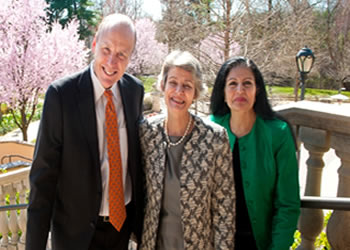As I was preparing my remarks for our annual International Women’s Day Luncheon held yesterday in Washington, I could not help but reflect on the story of a young girl in Malawi named Kumbukani, who despite all odds turned a seemingly shattered life into a powerful journey. From falling into a trap door of teen pregnancy and dropping out of school, Kumbukani was able to stare reality in the face and change her life by returning to school and becoming a peer educator with a UN Joint Program in Malawi.
 It is girls like Kumbukani that remind me of the true nature and inspiration behind the work of the UN and its relevant agencies. More girls are being given a second chance through basic education, scholarships and math and science camps; all of which are made possible by the enduring work of UNESCO. Over three years, the program will have a direct impact on 30,000 girls and provide indirect support to more than 550,000. Those are not insignificant numbers.
It is girls like Kumbukani that remind me of the true nature and inspiration behind the work of the UN and its relevant agencies. More girls are being given a second chance through basic education, scholarships and math and science camps; all of which are made possible by the enduring work of UNESCO. Over three years, the program will have a direct impact on 30,000 girls and provide indirect support to more than 550,000. Those are not insignificant numbers.
As we came together to celebrate women and girls yesterday, we had the privilege of being joined by UN Assistant Secretary General and Deputy Executive Director of UN Women Lakshmi Puri and Director-General of UNESCO Irina Bokova.
Bokova, a strong and inspiring woman herself, spoke about the importance of education and how it is one of the main pillars of UNESCO. The Director General stressed that gender equality is a human rights issue, and empowerment through education will be a game changer for economic development. As much progress as we’ve made in recent years though, Bokova reminded us that there is still much more to be done. “Young girls and women are changing the world, and we need to support them,” she said.
Beyond the important work they are doing in Malawi, UNESCO also supports the United States by instituting education programs in both Iraq and Afghanistan. In June, UNESCO launched a program aimed at improving the literacy skills of nearly 3,000 members of the Afghan National Police (ANP) over the next 20 months. This work is essential to helping the U.S. train Afghan security forces and continue its transition out of the country by 2014.
To echo the words of Irina Bokova, it is essential that the U.S. continues to engage with UNESCO and fully fund the UN agency, so girls like Kumbukani have a chance at a brighter future and American interests in both Iraq and Afghanistan are kept at the top of the priority list.
As the world wraps up its 101st year celebrating International Women’s Day, we here at UNF are proud to embark on our Universal Access Project, founded on the commitment to healthier women, stronger families, and more stable prosperous communities. It’s based on a simple goal – to ensure that the United States continues to play a leadership role in ensuring that the more than 215 million women around the world who want access to voluntary family planning, but don’t have it, finally get the services they desperately seek.
The Universal Access Project will help women just like Kumbukani access health care services and improve the wellbeing of their families. To learn more about her journey, watch her inspiring video.



 View All Blog Posts
View All Blog Posts